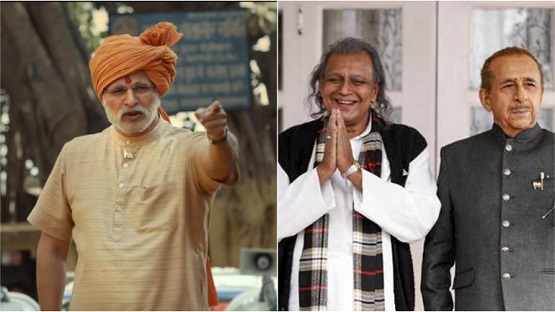
India, the world’s largest democracy, went to polls on April 11 this year. The stakes were high and political parties went the extra mile to woo voters. Narendra Modi and Rahul Gandhi went head to head on the ground, and their cinematic counterparts are set to battle it out at the box office now. This week we have Vivek Oberoi stepping into the shoes of Prime Minister Narendra Modi, in a film on the Indian Prime Minister. Vivek’s film is seeing the light of day on May 24, a day after the results of Lok Sabha 2019 polls are announced. This is victory for Vivek Oberoi, who has been struggling to see the release of his film since April 5. Before the Omung Kumar-directed biopic PM Narendra Modi is thrown to the audience, we take a look at the films that kept us busy this election season. This Lok Sabha election, we saw the battlefield shrinking to 70mm. 2019 kicked off with the release of Vijay Ratnakar Gutte’s The Accidental Prime Minister on January 11. Critics unanimously considered the political drama to be a hardly-veiled attack on the Congress. “Mujhe toh doctor saab Bhishma jaise lagte hai. Jinme koi buraai nahi hai, par family drama ke victim ho gaye,” Akshaye Khanna’s character says in The Accidental Prime Minister about Dr Manmohan Singh, former Indian Prime Minister, on whom the film is based. Over and over, it is emphasised that the “family” (referring to the Nehru-Gandhi family) is dictatorial and interferes excessively, whether it is the making of policies, to trying to make Manmohan Singh sit out the Lok Sabha election. Not just this, the possible prime ministerial candidate of the Congress, Rahul Gandhi, is shown to be a bumbling novice to the point of mockery. Though the Bharatiya Janata Party (BJP) had no ostensible connection with The Accidental Prime Minister, the official Twitter handle of the party shared the trailer and wrote, “Riveting tale of how a family held the country to ransom for 10 long years. Was Dr Singh just a regent who was holding on to the PM’s chair till the time heir was ready?” Interestingly, director Vijay Ratnakar Gutte has a connection with the ruling party too – his father Ratnakar Gutte contested the 2014 Assembly elections as a BJP-alliance candidate from the Gangakhed seat in Maharashtra. Just two weeks after The Accidental Prime Minister, the Shiv Sena came out with Thackeray, the biopic on Shiv Sena founder Balasaheb Thackeray, which was written and produced by Shiv Sena MP Sanjay Raut. Since it was officially sponsored by the party, the film did not even attempt to be subtle. Bal Thackeray’s Hindu Hriday Samrat image is highlighted throughout the film. In an early scene, when the judge asks him about inciting his supporters to tear down the Babri Masjid, Thackeray replies, “Nahi, nahi. Toda nahi, saaf kiya.” This is immediately followed by roaring chants of ‘Jai Shri Ram, Jai Shri Ram’ in the background. Thackeray is no more than a series of provocative speeches, with tigers roaring all over the background music. The Marathi manoos is reminded that the Shiv Sena deserves their vote as it was Bal Thackeray who ended the monopoly of “saale yandugundu” and got them jobs at a time when they were largely overlooked in the newly-emerging service sector. Right after the PM Narendra Modi biopic went on floors, Kamasutra 3D director Rupesh Paul announced My Name Is RaGa, which attempts to show the rise of Congress president Rahul Gandhi after facing immense negativity. If you thought that the Congress was in any way associated with the film, you could not be farther from the truth. Director Rupesh Paul revealed in an interview with a newspaper that he is the “producer on paper” as “people who are investing money don’t want to reveal their names”. He said, “Some of them are BJP workers, and some are close to the party and don’t wish to reveal their identities. The producers may or may not put their names, depending on what they wish after the film is handed over.” When the trailer hit the internet, it was mercilessly trolled and called a “parody” film. Sample this: there is a scene in which a woman presumed to be Rahul Gandhi’s love interest asks him, “Tumhe pata hai ki hum tumse itna pyaar kyun karte hai? Kyunki tumne humein jeetna sikhaya hai. Jis Rahul ka logon ne mazaak udaya, aaj woh unhi logon ka pyaara RaGa hai.” He then winks at her response. As subtle as a sledgehammer. Vivek Agnihotri’s The Tashkent Files the theatres on April 12, a day after India kicked off the first phase of Lok Sabha polls, and its motive was questionable. The film attempted to unravel the mystery behind the death of former prime minister Lal Bahadur Shastri in Tashkent, hours after signing a peace agreement with Pakistan. One character in the film even explained the concept of “dimlighting” – “kamre mein itni kum roshni kar do ki sab dhundhla ho jaaye aur kisiko pata hi na chale ki sach kya hai aur jhooth kya hai”. The same can be said about the film, which tosses around conspiracy theories before pinning the blame on the Congress and Indira Gandhi. But there is a catch – The Tashkent Files “does not claim historical accuracy” despite masquerading unproven “facts” as the truth. The film was panned by critics, but is still in theatres, in the fifth week of its release.





